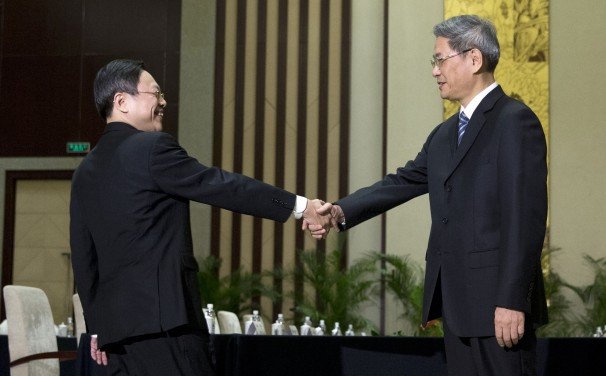Taiwan and China have begun the highest-level talks since the end of the Chinese civil war in 1949.
Wang Yu-chi and Zhang Zhijun, the top cross-strait officials from each side, are both attending the four-day talks in Nanjing.
No official agenda has been released for the talks, which are widely seen as a confidence-building exercise.
China regards Taiwan as part of its territory. In the past, all talks have gone via quasi-official organizations.
Zhang Zhijun, head of mainland China’s Taiwan Affairs Office, said: “It’s impossible to imagine in the past that we could sit here and meet [today].”
“We must have some imagination if [we want to] resolve some difficulties, not just for such a meeting, we should also have a bigger imagination for cross-strait future development,” he added.
Wang Yu-chi, head of Taiwan’s Mainland Affairs Council, described the meeting as “a new chapter for cross-strait relations”.
“For us to simply sit at the same table, sit down to discuss issues, is already not an easy thing.”

Given the sensitivities, the meeting room had no flags on display, and the officials’ nameplates had no titles or affiliations, AFP news agency reported.
Beijing insists that Taiwan is part of China and has a stated aim of reclaiming the island.
Taiwan still calls itself the Republic of China and nominally claims the same territory as the Communist government in Beijing, although it does not press these claims.
The US is committed to defending Taipei, despite not formally recognizing Taiwan as an independent country.
The situation has created a decades-long military stand-off between Beijing and Washington.
But cross-strait ties have improved since Taiwan’s pro-Beijing President Ma Ying-jeou was elected in 2008.
Cross-strait flights began in 2008, and tourists from the mainland have boosted Taiwan’s economy.
Trade agreements have allowed Taiwanese technology firms to expand massively, investing billions of dollars in the mainland.
However, Ma Ying-jeou is unpopular and analysts say his governing Kuomintang party is likely to lose local elections later this year.
The talks are the first formal government-to-government dialogue since the 1949 split.
Taiwan negotiators are likely to propose the posting of permanent representatives on each other’s territories.
But they will also face pressure to talk about press freedom after China refused accreditation to several media outlets.
Many Taiwanese are sensitive to issues of press freedom, having lived under a dictatorship that tightly controlled the media until the 1980s.
[youtube Z90Zv1LaMa4 650]
